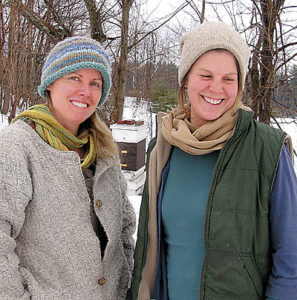 |
| Mary Perry (left) and Cate Stoner at Winterberry Farm. Both are single mothers who are trying to make their living by farming. English photo. |
By Jean English
Many of us who were inspired to move onto the land after reading Helen and Scott Nearing’s Living the Good Life eventually encountered a factor they hadn’t mentioned: children. When the little ones arrived, the good life got even better – but more complex than we’d anticipated.
For Mary Perry of Winterberry Farm in Belgrade and Cate Stoner of Turning Wheel Farm in Bowdoinham, the good life with kids has one more dimension: Both are single mothers trying to make a living entirely by farming. While their experiences have not been easy, both are persevering – out of love for the land and its ability to heal; love for their children and a desire to be home with them; and love for providing people with good food.
As Real as It Gets
Perry grew up on a farm in Connecticut, where she became skilled in floral design, and moved to her 40-acre Maine farm, on the shore of Great Pond, in 2001. She was told then that she wouldn’t be able to live on a farming income, and she’s been asked, “Why don’t you just go get a real job?”
Despite the discouraging remarks, Perry started farming “because I needed money to raise my kids.” She has three children.
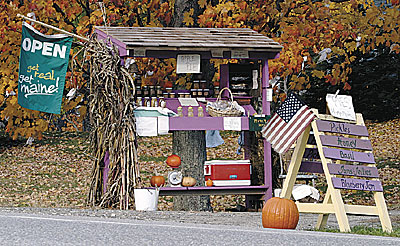 |
| An early farm stand at Winterberry Farm. Photo courtesy of Mary Perry. |
Her first market was modest: She got an old table from her grandmother’s garage, set it in her front yard along Route 27, and put home-baked pies and extra basil from her garden on it. The goods sold out, and her reputation as a pie chef grew.
A couple of years later, John Harker of the Maine Department of Agriculture stopped at her roadside table and asked about her enterprise. He subsequently got her into the Farms for the Future Program and helped her get a loan through Coastal Enterprises Inc. to build a farm stand.
Now Perry has an attractive stand with a state-inspected kitchen in it where she bakes her pies, cookies and breads. Customers can also buy produce grown in the Winterberry Farm garden and tomatoes from the farm’s greenhouse; “cottage bouquets” of 20 stems in quart Mason jars for $8 (a favorite for summer tourists); Perry’s jams and jellies; pottery by Malley Webber of Hallowell; herbal products from Avena Botanicals; Trillium soaps; Swallowtail Farm yogurt, cheeses and raw milk; spun and dyed wool yarn from Perry’s three Romney sheep; and socks that Perry knits from that wool and sells for $30 to $35 per pair. (Perry either spins the wool herself or has it spun at Hope Spinnery in Hope, Maine – the only place that can handle the long staple of her Romneys.)
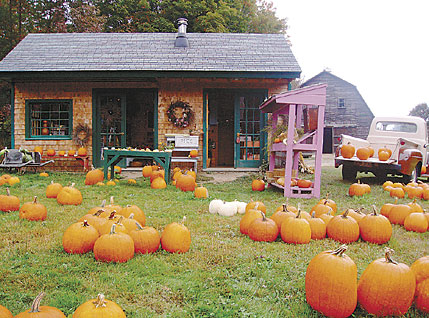 |
| The new farm stand has a commercial kitchen and an attractive display area. Photo courtesy of Mary Perry. |
Perry’s pies are made from fruits from local farms. With an interest in health, she’s developing a whole wheat pie crust that she hopes mainstream customers (who tend to prefer a white flour crust) will like. In July and August, she sells at least 30 pies daily.
To meet the needs of and connect with year-round residents, Perry has a 25-member Community Supported Agriculture (CSA) enterprise. Members get organic vegetables, herbs and cut flowers.
A team of Haflinger draft ponies provides farm power and pulls sleigh rides in winter – another source of income for Perry. The Perrys also raise organic free range laying hens, organic meat broilers, a couple of ducks, a rescued goose, and two pigs.
In addition to farming, Perry is home schooling her 9-year-old son, Gil, using a Waldorf curriculum that emphasizes farming, large motor skills and building. Daughter Kenya is in middle school, and the youngest daughter, Sage, is a self-assured 3-year-old who seems ready to run the farm herself.
Turning Wheel Farm
Cate Stoner grew up in Lancaster and Chester counties in Pennsylvania, where the Amish farmscape inspired her. After college she cooked food and worked in a variety of farm operations. She eventually moved to Maine, where she helped start two farms and continues to help on one farm.
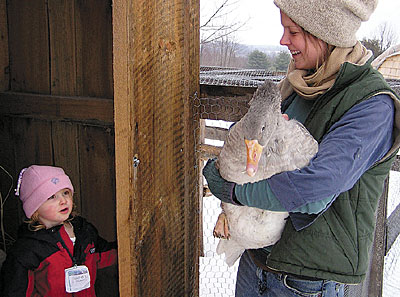 |
| Stoner holds a rescued goose while Perry’s daughter Sage looks on. English photo. |
This year she’s starting her own operation on land owned by George Christopher in Bowdoinham. Nothing makes her feel so good as when she’s on the land, says Stoner. “It’s what makes sense to me and makes me feel good. It keeps me busy. What I know how to do is feed people.”
She intends to raise pastured pigs; ducks for eggs; vegetables and grains; and her 6-year-old son, Flynn.
Stoner’s in the process of putting up an off-grid house with solar panels (“All I need are lights and my radio”), installing a well, constructing an outhouse, and setting up fencing.
She’ll grow peas and oats and feed her pigs on that plot once the oats are in the milky stage. This should help balance their feed ration and enable Stoner to spend less on grain. Cooperating with other farmers, she is buying grain in bulk and storing it in a silo on the Christopher Farm.
Stoner will sell her 20 or so pigs through a pig CSA, with half a pig per customer. She also hopes to offer a winter CSA by direct-seeding crops on her land this summer, since she doesn’t yet have a greenhouse where she can start seedlings for a summer CSA.
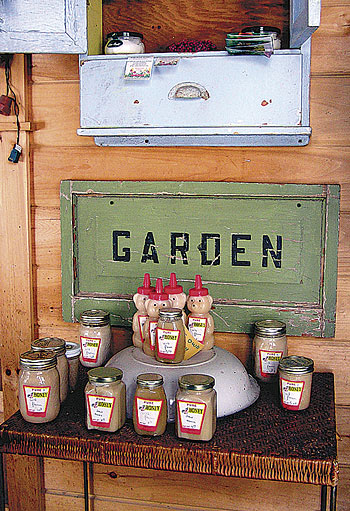 |
| Honey, yarn, knit goods and other products (including pies!) fill the Winterberry farm stand. English photo. |
Although Stoner has had plenty of experience helping others farm, this is the first time she’ll have farmed on her own. She entered MOFGA’s Journeyperson Program last year, which is very helpful, except that she can’t take advantage of all it has to offer (such as a long evening business class) because she’s a single parent. That may change as she’s “slowly learning to take advantage of the extremely supportive Bowdoinham community.”
Finding Help at MOFGA and Beyond
Perry and Stoner praise MOFGA and its support system. “MOFGA is a group of us growing food for good reasons,” says Perry. Its CSA conference was valuable – Perry picked up a few new members there – and she says that MOFGA’s organic marketing coordinator, Melissa White Pillsbury, is fabulous.
Perry also praises MOFGA’s organic crop specialist, Eric Sideman. “I can call Eric anytime and ask what’s wrong with my zucchini.”
At the Common Ground Country Fair, “I feel like I have a place I can go and dress the way I dress and nurse where I want to nurse and eat really good food,” she says.
Perry envisions eventually enabling women who are recovering from abuse to learn how to farm at Winterberry Farm.
“This is a place where women can come and farm – a safe haven where they can heal” – just as Perry herself has done. “Every day I feel more whole. It’s natural to be a woman and connected with the earth,” she says. “Farming is about keeping my kids and my sanity, feeling really good about myself.”
In addition to MOFGA staff, Perry is working with Stephanie Gilbert of the Maine Department of Agriculture to get a land easement.
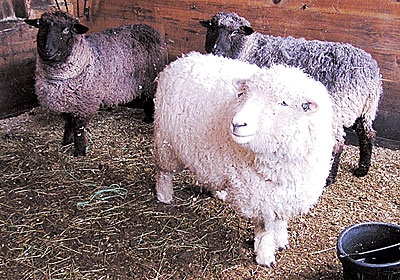 |
| Perry’s three Romney sheep provide wool for socks that Perry knits and sells at her farm stand. English photo. |
Perry says to “find a tax person who is also a farm person.” For her, Juanita Reynolds of Village Accounting in Unity has met that need. Likewise, she says, “When you need a loan, go to a farm group. A bank will just laugh at you.”
For Stoner, George Christopher of Christopher Farm has been “a huge help,” offering her a lease on the land. “It’s an amazing opportunity. If he didn’t do that, I don’t know where I’d go.”
Seeking More Connections
Stoner says that her CSA is her family. Many have offered her materials for her house, such as windows. Still, she’d like a greater network with other single mothers who are farmers.
“Being connected with each other would be huge,” says Perry. The bond that she and Stoner have developed since a 2008 Farmer to Farmer workshop has already given these two strong, like-minded women and their children a deep connection. They believe that a session specifically for single parent farmers would bring even more, similar people together.
The Winterberry Farm stand is open every day until Labor Day, then Wednesdays through Sundays until January 1. The farm is located on Route 27 (538 Augusta Rd., Belgrade, ME 04917; 207-495-2593; www.winterberryfarmstand.com), 15 miles north of Augusta and 2 miles north of the Christy’s/Irving store, on the right.
Cate Stoner’s Turning Wheel Farm is located on White Rd., Bowdoinham 04008; 380-5355.
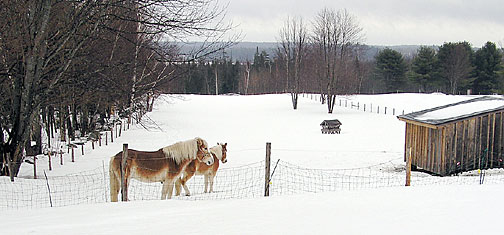 |
| Haflinger draft ponies provide farm power and pull sleigh rides in winter – a source of income for Perry. English photo. |
Two Mothers’ Tips for Farming with Kids
Farm with your baby on your back when he or she is small.
Put a wading pool by the garden.
Let kids work and play (with toy trucks, for instance) in the garden.
Sing songs and tell stories while you’re in the garden.
Ask them to fetch tools for you.
Give them their own little projects.
Realize that sometimes your children will be disappointed because you have to do something on the farm rather than play with them. Explain the necessity of the work to them.
Wake up and do some farming before they’re up in the morning.
Put a head lamp on and work outside after they’re asleep at night.
Learn how to ask for help. “People enjoy helping,” says Stoner. “Let them have that joyful experience.” “You can always give them a chicken,” adds Perry.
Resources
Coastal Enterprises Inc. – Helps create economically and environmentally healthy communities in which all people, especially those with low incomes, can reach their full potential. www.ceimaine.org/
Farms for the Future – A business development program for Maine farmers. www.ceimaine.org/content/view/120/170/
“George Christopher’s Incubator Farm,” by Marada Cook, The Maine Organic Farmer & Gardener, Sept.-Nov. 2008; https://www.mofga.org/Publications/MaineOrganicFarmerGardener/Fall2008/IncubatorFarm/tabid/979/Default.aspx
Maine Women’s Agricultural Network, WAgN, www.timeandtide.org/wagn_-_home
Village Accounting, 207 School Street, Unity, ME 04988; 207-948-6168
Maine Centers for Women, Work and Community – Offers free micro-enterprise and other trainings around the state, as well as Family Development Accounts (FDAs) – matched savings accounts that help individuals and families reach “asset goals” of buying a home, starting a business, or paying for their education. The program has worked with farmers, such as one who used the FDA to buy equipment for the farm through the “starting a business” option. There is an application process for the program as well as some eligibility requirements.
According to a flyer from the Maine Centers for Women, Work and Community, this is how the Family Development Accounts (FDA) work: You deposit money in your local bank or credit union; the Centers add twice that amount to your account (e.g., if you deposit $1, they deposit $2), and you can use that money to fund a home purchase, education, or a new or existing business. To apply, call Call Women, Work and Community, Laurie McDonnell 753-6612, or Jean Dempster 1-800-442-2092. Among the eligibility requirements are household incomes at or below $21,660 for one person; $29,140 for two; $36,620 for three; and $44,100 for four. For more information, see www.womenworkandcommunity.org.
